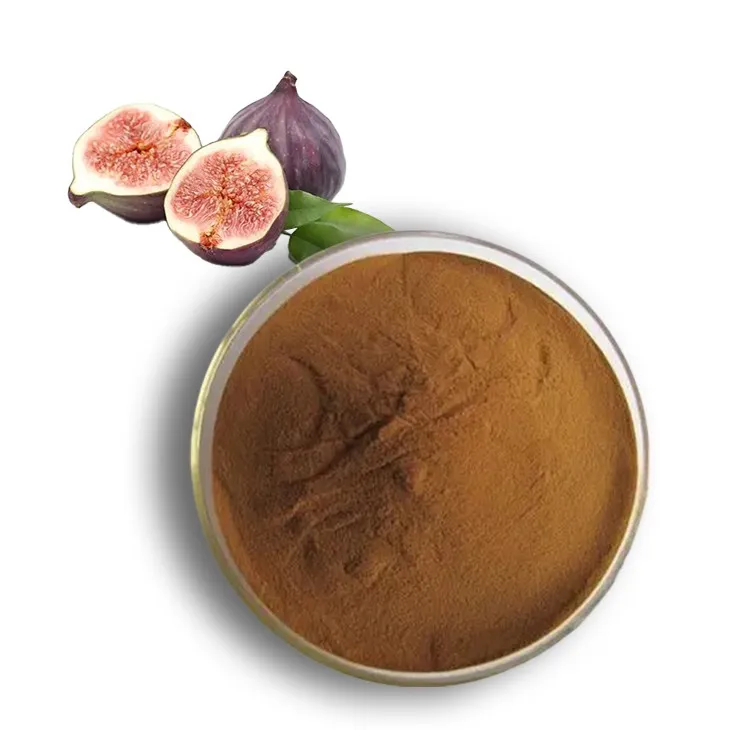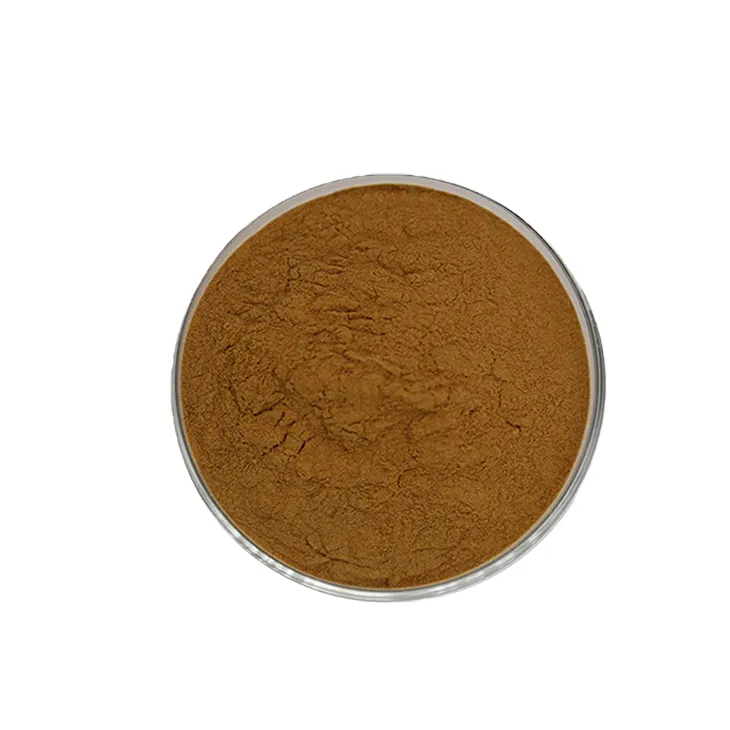- 0086-571-85302990
- sales@greenskybio.com
10 Amazing Health Benefits of Fig Extract
2024-11-13

1. Anti - Inflammatory Properties
Fig Extract is renowned for its anti - inflammatory properties. Inflammation is a natural response of the body's immune system to injury or infection. However, chronic inflammation can lead to various health problems, including heart disease, diabetes, and arthritis. The compounds present in Fig Extract, such as flavonoids and phenolic acids, help to reduce inflammation in the body. These compounds work by inhibiting the production of pro - inflammatory cytokines, which are molecules that play a key role in the inflammatory response.
Studies have shown that Fig Extract can be effective in reducing inflammation in various parts of the body. For example, in a study on animals with arthritis, fig extract was found to significantly reduce joint inflammation and pain. This suggests that fig extract may have potential as a natural treatment for arthritis in humans. Additionally, fig extract may also help to reduce inflammation in the digestive tract, which can be beneficial for people with inflammatory bowel diseases such as Crohn's disease and ulcerative colitis.

2. Antioxidant Effects
Another remarkable health benefit of fig extract is its antioxidant effects. Antioxidants are substances that protect the body's cells from damage caused by free radicals. Free radicals are unstable molecules that are produced during normal cellular metabolism as well as in response to environmental factors such as pollution, radiation, and smoking. If left unchecked, free radicals can cause oxidative stress, which has been linked to numerous health problems, including cancer, heart disease, and neurodegenerative diseases.
Fig extract is rich in antioxidants, including vitamin C, vitamin E, and beta - carotene. These antioxidants work together to neutralize free radicals and prevent them from causing damage to cells. In addition, fig extract also contains phenolic compounds, such as anthocyanins and flavonols, which have been shown to have strong antioxidant properties. By consuming fig extract, you can increase the antioxidant levels in your body and reduce your risk of developing various diseases associated with oxidative stress.

3. Digestive Health
Fig extract can have a positive impact on digestive health. It contains dietary fiber, which is essential for maintaining a healthy digestive system. Fiber helps to add bulk to the stool, making it easier to pass through the intestines. This can prevent constipation and promote regular bowel movements.
In addition, fig extract may also help to improve the function of the digestive enzymes. Digestive enzymes are responsible for breaking down food into smaller molecules that can be absorbed by the body. Fig extract contains compounds that can stimulate the production of digestive enzymes, thereby enhancing the digestion and absorption of nutrients.
Moreover, fig extract has prebiotic properties. Prebiotics are substances that promote the growth of beneficial bacteria in the gut. The beneficial bacteria in the gut play a crucial role in maintaining digestive health, as they help to break down food, produce vitamins, and protect against harmful bacteria. By consuming fig extract, you can nourish the beneficial bacteria in your gut and improve your overall digestive health.

4. Heart Health
The consumption of fig extract can contribute to heart health in several ways. Firstly, its anti - inflammatory and antioxidant properties help to protect the blood vessels from damage. Inflammation and oxidative stress in the blood vessels can lead to the development of atherosclerosis, which is a condition characterized by the buildup of plaque in the arteries. By reducing inflammation and oxidative stress, fig extract can help to prevent the formation of plaque and keep the arteries clean and healthy.
Secondly, fig extract may help to lower blood pressure. High blood pressure is a major risk factor for heart disease. The potassium content in fig extract may play a role in regulating blood pressure. Potassium helps to relax the blood vessels, which in turn reduces blood pressure.
Thirdly, fig extract may also have a positive effect on cholesterol levels. It can help to lower LDL (low - density lipoprotein) cholesterol, which is often referred to as "bad" cholesterol, while increasing HDL (high - density lipoprotein) cholesterol, which is known as "good" cholesterol. This can help to improve the lipid profile and reduce the risk of heart disease.
5. Blood Sugar Regulation
Fig extract may be beneficial for blood sugar regulation. It contains compounds that can help to improve insulin sensitivity. Insulin is a hormone that is responsible for regulating blood sugar levels. In people with diabetes or insulin resistance, the body's cells become less responsive to insulin, leading to high blood sugar levels. By improving insulin sensitivity, fig extract can help the cells to better respond to insulin and regulate blood sugar levels more effectively.
Additionally, fig extract may also slow down the absorption of carbohydrates in the digestive tract. This can prevent a rapid rise in blood sugar levels after a meal. However, it is important to note that while fig extract may have potential benefits for blood sugar regulation, it should not be used as a substitute for medical treatment in people with diabetes.
6. Immune System Support
Fig extract can provide support to the immune system. The antioxidants and other bioactive compounds in fig extract help to strengthen the immune system. Antioxidants protect the immune cells from damage caused by free radicals, allowing them to function more effectively.
In addition, fig extract contains vitamins and minerals, such as vitamin C, zinc, and iron, which are essential for a healthy immune system. Vitamin C is known for its immune - boosting properties, while zinc and iron are involved in various immune functions, such as the production of white blood cells. By consuming fig extract, you can ensure that your immune system has the necessary nutrients to fight off infections and diseases.
7. Skin Health
The antioxidant and anti - inflammatory properties of fig extract make it beneficial for skin health. Antioxidants in fig extract can protect the skin from damage caused by free radicals, such as premature aging, wrinkles, and sun damage. Free radicals can break down collagen and elastin in the skin, which are proteins that are responsible for maintaining the skin's elasticity and firmness. By neutralizing free radicals, fig extract can help to keep the skin looking young and healthy.
The anti - inflammatory properties of fig extract can also be helpful for people with skin conditions such as acne, eczema, and psoriasis. Inflammation in the skin can exacerbate these conditions. By reducing inflammation, fig extract can help to soothe the skin and reduce the symptoms of these skin problems.
Moreover, fig extract may also have moisturizing properties. It can help to keep the skin hydrated, which is essential for maintaining healthy skin.
8. Bone Health
Fig extract can contribute to bone health. It contains minerals such as calcium, magnesium, and phosphorus, which are essential for building and maintaining strong bones. Calcium is the main mineral in bones, while magnesium and phosphorus play important roles in bone structure and function.
In addition, fig extract may also help to improve bone density. Bone density is a measure of the amount of bone mineral in a given volume of bone. Low bone density is a risk factor for osteoporosis, a condition characterized by weak and brittle bones. Studies have shown that the compounds in fig extract can stimulate the activity of osteoblasts, which are cells that are responsible for building new bone. By increasing the activity of osteoblasts, fig extract can help to improve bone density and reduce the risk of osteoporosis.
9. Cancer Prevention
While more research is needed, fig extract may have potential in cancer prevention. The antioxidants in fig extract can help to protect the cells from DNA damage, which is a key step in the development of cancer. DNA damage can lead to mutations in the genes that control cell growth and division, which can cause cells to become cancerous. By neutralizing free radicals and preventing DNA damage, fig extract may help to reduce the risk of cancer.
In addition, some studies have suggested that certain compounds in fig extract may have anti - cancer properties. For example, some phenolic compounds in fig extract have been shown to inhibit the growth of cancer cells in vitro. However, it is important to note that these findings are still preliminary, and more research is needed to determine the effectiveness of fig extract in cancer prevention and treatment.
10. Weight Management
Fig extract can be a useful addition to a weight management plan. As mentioned earlier, it contains dietary fiber, which can help to increase satiety and reduce appetite. Fiber takes longer to digest, which means that it can keep you feeling full for longer periods of time. This can help to prevent overeating and reduce calorie intake.
In addition, fig extract may also help to boost metabolism. A faster metabolism means that the body burns calories more efficiently. While the exact mechanism by which fig extract boosts metabolism is not fully understood, it may be related to its effect on digestive enzymes or its antioxidant properties.
FAQ:
What are the anti - inflammatory benefits of fig extract?
Fig extract contains compounds that can help reduce inflammation in the body. These compounds may inhibit certain inflammatory pathways and cytokines, which are molecules involved in the inflammatory response. By reducing inflammation, fig extract may potentially help with conditions such as arthritis, where chronic inflammation is a key factor.
How do the antioxidant properties of fig extract work?
Fig extract is rich in antioxidants like phenolic compounds and flavonoids. These antioxidants work by scavenging free radicals in the body. Free radicals are unstable molecules that can cause damage to cells, DNA, and proteins. The antioxidants in fig extract donate electrons to these free radicals, neutralizing them and preventing them from causing oxidative stress, which is associated with various diseases such as cancer and heart disease.
Can fig extract help with digestion?
Yes, fig extract can be beneficial for digestion. It contains dietary fiber which can add bulk to the stool and promote regular bowel movements. Additionally, it may help stimulate the digestive enzymes in the gut, which can enhance the overall digestive process. This can be helpful for those with digestive issues such as constipation or indigestion.
Is fig extract good for the skin?
Due to its antioxidant and anti - inflammatory properties, fig extract can be good for the skin. The antioxidants can protect the skin cells from damage caused by environmental factors like UV radiation and pollution. The anti - inflammatory properties can help soothe skin conditions such as eczema or acne, reducing redness and irritation.
How can fig extract contribute to heart health?
Fig extract may contribute to heart health in several ways. Its antioxidant properties can help prevent the oxidation of LDL cholesterol, which is a risk factor for heart disease. It may also help reduce inflammation in the blood vessels, improving their function. Additionally, the fiber content in fig extract can help lower cholesterol levels, further reducing the risk of heart - related problems.
Related literature
- The Health - Promoting Properties of Fig Extract: A Review"
- "Fig Extract: Antioxidant, Anti - inflammatory and Therapeutic Applications"
- "Beneficial Effects of Fig - Derived Compounds on Human Health"
- ▶ Hesperidin
- ▶ Citrus Bioflavonoids
- ▶ Plant Extract
- ▶ lycopene
- ▶ Diosmin
- ▶ Grape seed extract
- ▶ Sea buckthorn Juice Powder
- ▶ Fruit Juice Powder
- ▶ Hops Extract
- ▶ Artichoke Extract
- ▶ Mushroom extract
- ▶ Astaxanthin
- ▶ Green Tea Extract
- ▶ Curcumin
- ▶ Horse Chestnut Extract
- ▶ Other Product
- ▶ Boswellia Serrata Extract
- ▶ Resveratrol
- ▶ Marigold Extract
- ▶ Grape Leaf Extract
- ▶ New Product
- ▶ Aminolevulinic acid
- ▶ Cranberry Extract
- ▶ Red Yeast Rice
- ▶ Red Wine Extract
-
Dan Shen Root Extract/Salvia Root Extract
2024-11-13
-
Hesperidin
2024-11-13
-
Polygonum multiflorum extract
2024-11-13
-
Dandelion Root Extract
2024-11-13
-
Bilberry Extract
2024-11-13
-
Shikone Extract
2024-11-13
-
Eyebright Extract
2024-11-13
-
Centella Asiatica Extract
2024-11-13
-
Saponin Extract
2024-11-13
-
Jujube Extract
2024-11-13





















